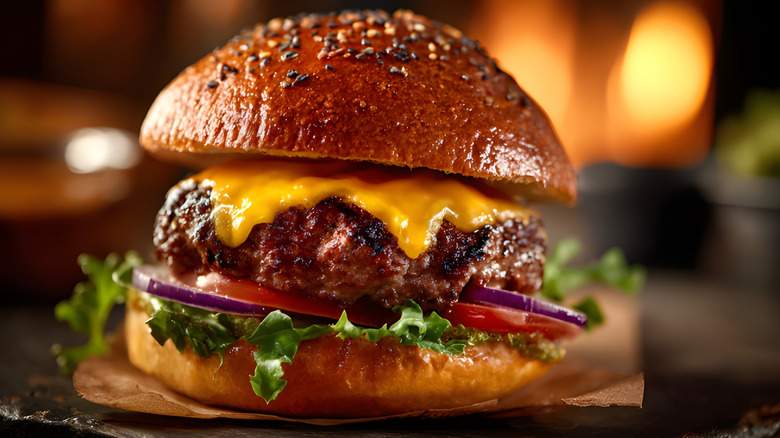The Cheese Trick Gordon Ramsay Swears By For Next-Level Burgers
Getting your cheese to perfectly melt on your burger can make or break your meal. While most recipes just have you add a lid to the patty, Gordon Ramsay suggests tossing a slice of cheese into a hot pan with a sprinkle of salt and letting it melt directly on the heat. Caramelization requires low enough levels of moisture to cook the sugars rather than steam them, so that little extra salt helps draw out excess water while also adding flavor. You won't need much time if your pan is hot enough; just 10 seconds can leave you with a bubbling, caramelized spread of goodness ready for the next step. Ramsay places the bottom bun directly on top of the melted cheese and, using a spinning motion, gathers it all up to create a melty, roasted topping that upgrades any burger.
The key here is to use cheese with enough fat that it won't stick to the pan. Cheddar and American cheese are great choices, but you can get creative and even use Bobby Flay's Memorial Day burger topping, pimento cheese, provided you use a non-stick pan. While this may not work for every type of cheese, most varieties have the fat content you need to customize your burger however you like.
The best cheeses to use for Gordon Ramsay's trick
Even if you have a cheese with great meltability, it doesn't necessarily mean it'll work for this trick. Exceptionally soft cheeses, like chèvre, or ones that come in crumbles, like feta or blue cheese, don't react properly to direct heat, leaving you with inconsistent results.
The best cheeses for a burger are those with medium moisture levels (around 35 to 50% water). Pretty much any cheese you'd add to a tuna melt is a solid pick, and Gruyère, Gouda, Havarti, and cheddar are reliable choices with balanced flavor profiles that complement the roasted richness of caramelization. While you can grate cheese and add it directly to the pan, slices generally make the process easier since they melt more consistently than shreds.
Whatever you do, stay away from firm, aged cheeses like parmesan. They have so little moisture that they don't melt properly and can even burn from direct contact with the pan. High-moisture cheeses like mozzarella aren't necessarily bad, but, even with salt, they're often too wet to caramelize properly and just end up melting and steaming instead. Extremely moist cheeses can caramelize, but they usually require blisteringly hot radiant heat, like that in a pizza oven, to do so effectively.


